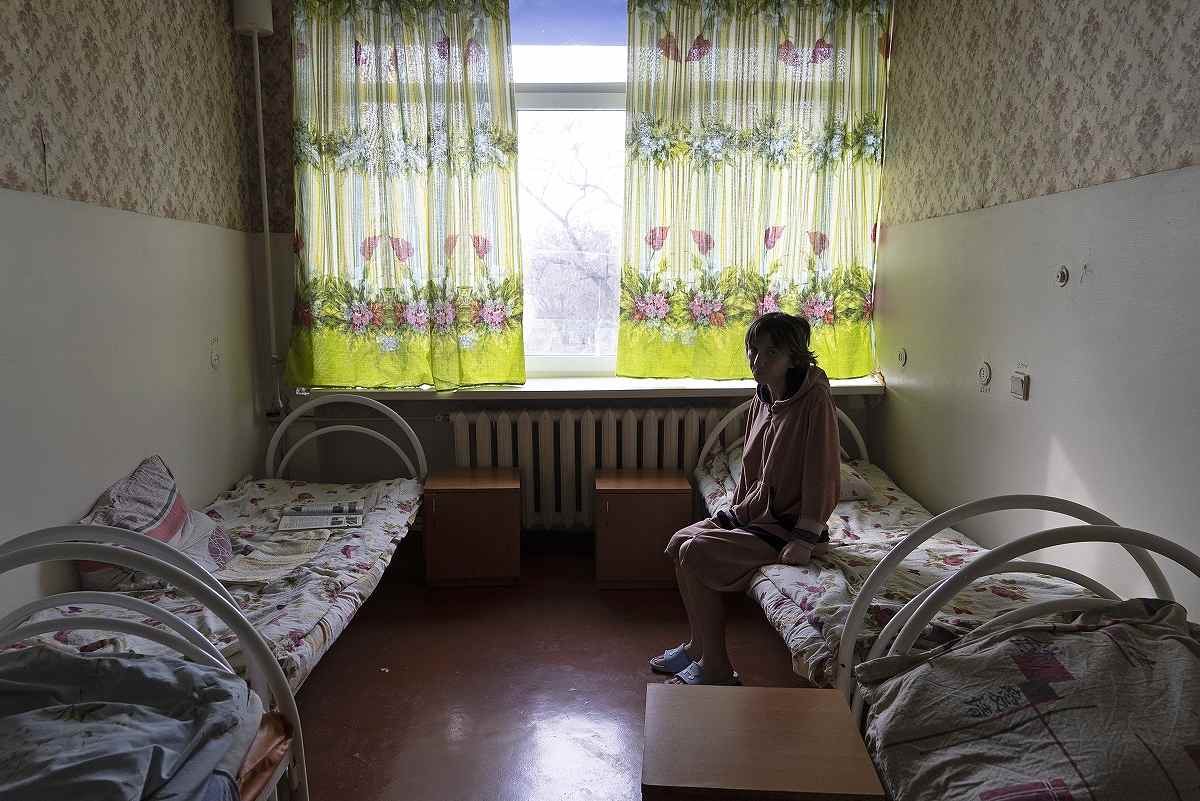
Natalia, 37, a patient, sits in her room at a psychiatric hospital in Kramatorsk, Ukraine, on March 21.
13:00 JST, April 24, 2023
KRAMATORSK, Ukraine (AP) — Huddled in the back of a cafe near the train station where a missile killed dozens of people a year ago, Nastya took slow, deliberate breaths to calm herself. Overnight, her neighborhood had been bombed again, and she just couldn’t take any more.
Heeding her parents’ advice, the 20-year-old woman had visited the nearby psychiatric hospital that morning — a place that also bore the scars of war after being repeatedly bombed, including by a missile that destroyed part of the building last September. But the staff swept up the shattered glass, shoveled away the debris and carried on working, determined to stay in Kramatorsk, in Ukraine’s eastern Donbas region, to help those in need.
For Nastya, it was a lifeline.
“After today’s shelling, I could no longer cope with anxiety, the feeling of constant danger,” the speech therapy student said, giving only her first name to talk last month about the difficult decision to seek mental health care. The stigma of Soviet-era psychiatry, when dissidents were incarcerated in psychiatric institutions as a form of punishment, still lingers.
“I just realized that my psychological health is much more important,” she said.
There are hundreds of thousands like Nastya in Ukraine, experts say, and the number of people needing psychological help is only expected to rise as the war continues. In December, the World Health Organization said one in five people in countries that have experienced conflict in the past decade will suffer from a mental health condition, and estimated that about 9.6 million people in Ukraine could be affected.
Russia’s invasion in February 2022 resulted in millions of people being displaced, bereaved, forced into basements for months due to incessant shelling or enduring harrowing journeys from Russian-occupied regions.
For Nastya, as for so many, the war changed everything overnight. There is a before — a life of simple pleasures, of going for coffee and laughing with friends. And an after.
“You wake up with the feeling that you are just surrounded by horrors, anxieties, surrounded by constant air raid sirens, flying planes, helicopters,” she said. “You’re simply in a closed circle which is not filled with the happy times of before, but with great fear. Fear of the unknown, fear of dying here and now.”
Hundreds of kilometers to the west, 38-year-old Tatyana, a worker at the Zaporizhzhia nuclear power plant who spent four months living under Russian occupation in the town of Enerhodar, trembled as she recounted seeing bombs explode near the plant, and how her family endured a 24-hour ordeal to escape to Ukrainian-held territory.
When she visited a support center in Boyarka, south of Kyiv, several months ago to register for aid, she collapsed into uncontrollable tears. The staff called a psychologist.
Therapy has helped, said Tatyana, who also asked that her surname not be used to talk openly about seeking out mental health care. Her gaze was blank and unfocused during pauses as she spoke following a group therapy session in early April. She’s trying to cope with the feelings of living in a war.
“This fear that comes when you realize that you may lose everything in a moment,” she said. Life is “like a light switch. It can be turned off and never turn on again.”
The need for mental health treatment has shot up across Ukraine, professionals say, even as they deal with the effects of war in their own lives.
“The demand is huge, and unfortunately it will only grow,” said psychotherapist Pavlo Horbenko, who has worked at a center in Kyiv treating people affected by war since 2014, when Russia annexed Crimea and set up two proxy breakaway states in Ukraine’s east.
He noted a significant increase in patients seeking treatment for sexual violence, bereavement and suicidal thoughts. “Previously, it was one or two requests a week, and now there can be 10 a day.”
Judging by other countries that have suffered conflict, psychological treatment needs increase rapidly after the fighting ends, Horbenko said.
For now, people are focused on surviving. “But when the war is over, … then we can afford to relax. And when we can relax, the symptoms that have been accumulating for all this time will appear,” he said.
Like a soldier wounded in battle who doesn’t feel pain until he is out of immediate danger, “that’s when the wounds start to hurt. This is how it is with psychological traumas.”
Horbenko said there has been an increase in the number of mental health specialists in Ukraine since 2014, but far more are needed. “The demand still far exceeds the capacity,” he said.
Authorities have been seeking to increase mental health services across Ukraine.
Lebanese psychiatrist Dr. Maya Bizri recently visited Ukraine as part of a program run by the medical aid organization MedGlobal, at the request of the Ministry of Health, to assess needs and train doctors and nurses in recognizing mental health issues in both colleagues and patients.
“What is really being affected … are the health care workers,” Bizri said. “There are a lot of trainings about how to deal with traumatized patients or with physical injuries, but no one addresses the health care of the health care professionals.”
Under the MedGlobal program, doctors and nurses are trained to help themselves and colleagues cope with psychological pressures, so they can in turn train others.
“There is an acute distress and an acute unmet need that is not being addressed, and if you want a health care system that is resilient, you have to take care of your own people,” Bizri said. “And I think the Ministry of Health is very aware of that because they are very engaged in doing this.”
Kramatorsk psychiatric hospital director Dr. Ludmyla Sevastianova said it was the need for mental health professionals that was helping them cope.
The war “affects us just as much as it affects patients,” she said. “We are also worried about our families, our relatives and friends. But we are doing our medical duty, we are helping.”
Sevastianova, a psychiatrist, has made it her mission “to save the hospital in order to keep people working, to save the hospital so it can provide care to patients. This is the goal and it helps.”
But she is under no illusions about the potential for long-term consequences.
“Things do not pass without a trace. I cut my hand, a scar remains. So it is with our psyche,” Sevastianova said.
“Now we need to adapt, we need to survive, we need to provide assistance, we need to work … What effects this will have, we will understand in the future.”
Top Articles in World
-

China Confirmed to Be Operating Drilling Vessel Near Japan-China Median Line
-

China Eyes Rare Earth Foothold in Malaysia to Maintain Dominance, Counter Japan, U.S.
-

Japan, Qatar Ministers Agree on Need for Stable Energy Supplies; Motegi, Qatari Prime Minister Al-Thani Affirm Commitment to Cooperation
-

North Korea Possibly Launches Ballistic Missile
-

10 Universities in Japan, South Korea, Mongolia to Establish Academic Community to Promote ICC Activities, Rule of Law
JN ACCESS RANKING
-

Univ. in Japan, Tokyo-Based Startup to Develop Satellite for Disaster Prevention Measures, Bears
-

JAL, ANA Cancel Flights During 3-day Holiday Weekend due to Blizzard
-

China Confirmed to Be Operating Drilling Vessel Near Japan-China Median Line
-

China Eyes Rare Earth Foothold in Malaysia to Maintain Dominance, Counter Japan, U.S.
-

Japan, Qatar Ministers Agree on Need for Stable Energy Supplies; Motegi, Qatari Prime Minister Al-Thani Affirm Commitment to Cooperation


























